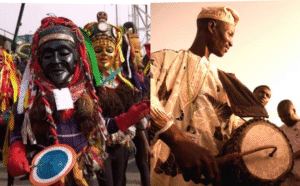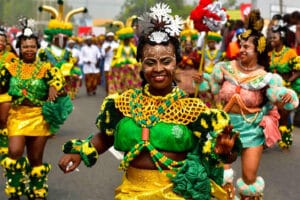Storytelling is a universal tradition shared by cultures across the world. In Africa, storytelling is deeply rooted in history and culture, passed down from generation to generation. African folktales, in particular, stand out for their unique characters, moral lessons, and creative narratives. But how do these ancient stories influence modern storytelling? This article explores the connection between African folktales and today’s literature, movies, and other creative works.
What Are African Folktales?
African folktales are traditional stories told to teach lessons, entertain, and pass on cultural values. These stories are often passed down orally, meaning they are spoken instead of written. They reflect the values, beliefs, and daily lives of African communities.
Common Themes in African Folktales
- Morality and Justice: Most African folktales have a lesson or moral at their core. They teach listeners to be honest, kind, and fair.
- The Importance of Community: These stories emphasize unity, teamwork, and the strength of the community.
- Respect for Nature: Animals, plants, and natural elements often play key roles, highlighting the harmony between humans and nature.
Based on these themes, African folktales clearly teach us three vital life lessons.
1. Morality and Justice
African folktales emphasize the importance of living a virtuous life. They teach:
- Honesty: Always tell the truth, as lies often lead to trouble.
- Kindness: Being kind to others brings rewards, while cruelty has consequences.
- Fairness: Treating everyone equally and justly ensures harmony in society.
2. The Importance of Community
These stories highlight the strength that comes from working together and valuing relationships:
- Unity: A united community can overcome challenges more effectively than individuals acting alone.
- Teamwork: Success is often achieved through collaboration.
- Responsibility: Everyone has a role to play in supporting their family or community.
3. Respect for Nature
African folktales teach a deep respect for the environment and its inhabitants:
- Harmony: Humans must live in balance with animals, plants, and natural elements.
- Gratitude: Nature provides resources, and it is essential to appreciate and protect them.
- Lessons from Nature: Animals and plants often symbolize human traits, teaching humility, cleverness, or patience.
African folktales offer timeless wisdom, teaching valuable lessons that promote personal growth, community cohesion, and environmental stewardship.
These themes collectively teach how to live a meaningful life rooted in values, community, and a connection to the natural world.
Famous Characters in African Folktales
- The Trickster: Characters like Anansi the Spider or Tortoise are clever and often use their wit to outsmart others.
- The Wise Elder: Elders in the stories are symbols of wisdom and guidance.
- The Brave Youth: Many tales feature young heroes who show courage and determination.

African folktales are more than just stories—they are tools for teaching and connecting with the past.
How African Folktales Influence Modern Storytelling
Characters Inspired by African Folktales
Modern storytelling often borrows characters and archetypes from African folktales. For example:
- Trickster Figures: Characters like Anansi influence modern tricksters in books, movies, and comics. They appear in works such as Neil Gaiman’s Anansi Boys.
- Brave Heroes: African folktales inspire stories of young heroes like those seen in Black Panther.
These characters bring depth to stories by representing universal human qualities such as cleverness, bravery, and resilience.
Moral Lessons in Modern Storytelling
African folktales always teach lessons. In today’s stories, we often see similar morals.
- Movies like The Lion King are inspired by African tales, teaching lessons about family, responsibility, and leadership.
- Books and films often use folktale structures to highlight good overcoming evil.
These moral lessons make stories relatable and meaningful, showing the undeniable relevance of African storytelling traditions.
Symbolism in African Folktales and Modern Media
African folktales use animals, objects, and natural elements to symbolize deeper meanings.
- Animals as Symbols:
- The lion often represents strength.
- The hare symbolizes cleverness.
- Nature’s Role:
- Rivers, mountains, and forests symbolize life, challenges, and growth.
In modern media, these symbols are reimagined. For example:
- The Lion King uses African wildlife to tell a universal story of growth and redemption.
- Animated movies and novels adapt folktale symbols to create visually engaging and meaningful narratives.
Examples of African Folktales in Modern Media
African Folklore in Films
- The Lion King: This Disney classic borrows themes and characters inspired by African folktales.
- Black Panther: Marvel’s blockbuster integrates African traditions, storytelling, and symbolism to create Wakanda’s rich culture.
- Lovecraft Country: The show incorporates African folklore to explore themes of identity and resilience.
African Folktales in Books
- Chinua Achebe’s Works: Novels like Things Fall Apart use storytelling traditions to reflect African life.
- Children’s Literature: Many children’s books today, such as Tales of Anansi, introduce young readers to African folktales.
- Graphic Novels: Works like Aya of Yop City blend African settings and storytelling with modern illustrations.
These examples show how African folktales have influenced various storytelling formats.
Why African Folktales Have Global Appeal
Universal Themes in Folktales
The themes in African folktales, such as bravery, love, and justice, are universal. People from all backgrounds can relate to these values, making the stories widely appealing.
Growing Interest in African Culture
With the rise of globalization, people are more interested in diverse stories. African folktales offer unique perspectives and enrich the world’s storytelling pool.
The growing popularity of African-inspired media, like Black Panther and African literature, highlights this global appeal.
Preserving African Folktales for Future Generations
The Role of Technology
Technology played and is playing a significant role in preserving and sharing African folktales today. Examples include:
- Storytelling Apps: Today there are several Apps that shares African stories, Apps like African Storybook make traditional stories accessible to children worldwide.
- Podcasts and Audiobooks: Platforms like Spotify host African folktale podcasts.
- Animation and Films: Animated movies adapt folktales for global audiences.
Educational Initiatives
Schools and organizations promote African folktales through programs, books, and cultural events. These efforts ensure that the stories remain relevant and continue to inspire new generations.
FAQs on African Folktales and Storytelling
Q1: Why are African folktales important in modern storytelling?
African folktales teach valuable lessons, inspire diverse characters, and add depth to modern stories through their unique narrative techniques.
Q2: What are examples of African folktales in popular culture?
Examples include The Lion King (inspired by African wildlife and themes) and Black Panther (integrating African symbolism and traditions).
Q3: How do African folktales influence writing techniques?
They introduce storytelling elements like moral lessons, non-linear narratives, and symbolic characters that enhance modern writing.
Q4: What role do animals play in African folktales?
Animals symbolize traits like strength, cleverness, and wisdom, which are often used to teach life lessons.
Conclusion
African folktales are a treasure trove of wisdom, creativity, and cultural heritage. Their influence on modern storytelling is undeniable, from inspiring characters and morals to shaping entire narratives. As these stories continue to gain recognition globally, they remind us of the power of tradition and the beauty of diverse perspectives.
If you’re a storyteller, dive into African folktales for inspiration—they might just add a new dimension to your work.
Share this:
- Click to share on Facebook (Opens in new window) Facebook
- Click to share on X (Opens in new window) X
- Click to share on LinkedIn (Opens in new window) LinkedIn
- Click to share on Pinterest (Opens in new window) Pinterest
- Click to share on Telegram (Opens in new window) Telegram
- Click to share on WhatsApp (Opens in new window) WhatsApp





